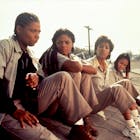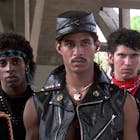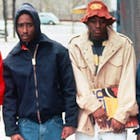
Love and Hip-Hop: 20 Years Of 'Brown Sugar'
Love and Hip-Hop: 20 Years Of 'Brown Sugar'
Published Tue, October 11, 2022 at 12:00 PM EDT
"When did you fall in love with Hip-Hop?"
Screenwriter Michael Elliott was inspired by the lyrics of Mary J. Blige's 1997 hit "Seven Days." in it Blige sings about a love that's exhausting but passionate, long-lasting but frustratingly incomplete. Elliott used that for a jumping off point and penned a script that was initially called "Seven Days." Director Rick Famuyiwa was coming off his success with 1999's The Wood, a coming-of-age/romantic comedy set in Famuyiwa's hometown of Inglewood. The movie starred rising Black stars Taye Diggs, Omar Epps and Sanaa Lathan and was a box office hit that year, cementing Diggs as a major actor and further positioning Lathan as a leading lady.
Things aligned for Famuyiwa to helm a film from Elliott's script. But the story was planted squarely in the context of Hip-Hop and Hip-Hop journalism. At the dawn of the 2000s, rap music was more mainstream than ever. Rappers were topping the pop charts and selling in the millions. They were also shilling products in heavy-rotated commercials by everyone from Verizon to RadioShack. The genre hadn't just survived it's hyper-commodification, it was basking in it. But rap nostalgia had also suddenly become in vogue, as the generation old enough to remember when Hip-Hop wasn't at the Grammys was questioning whether or not things had spiraled off course.
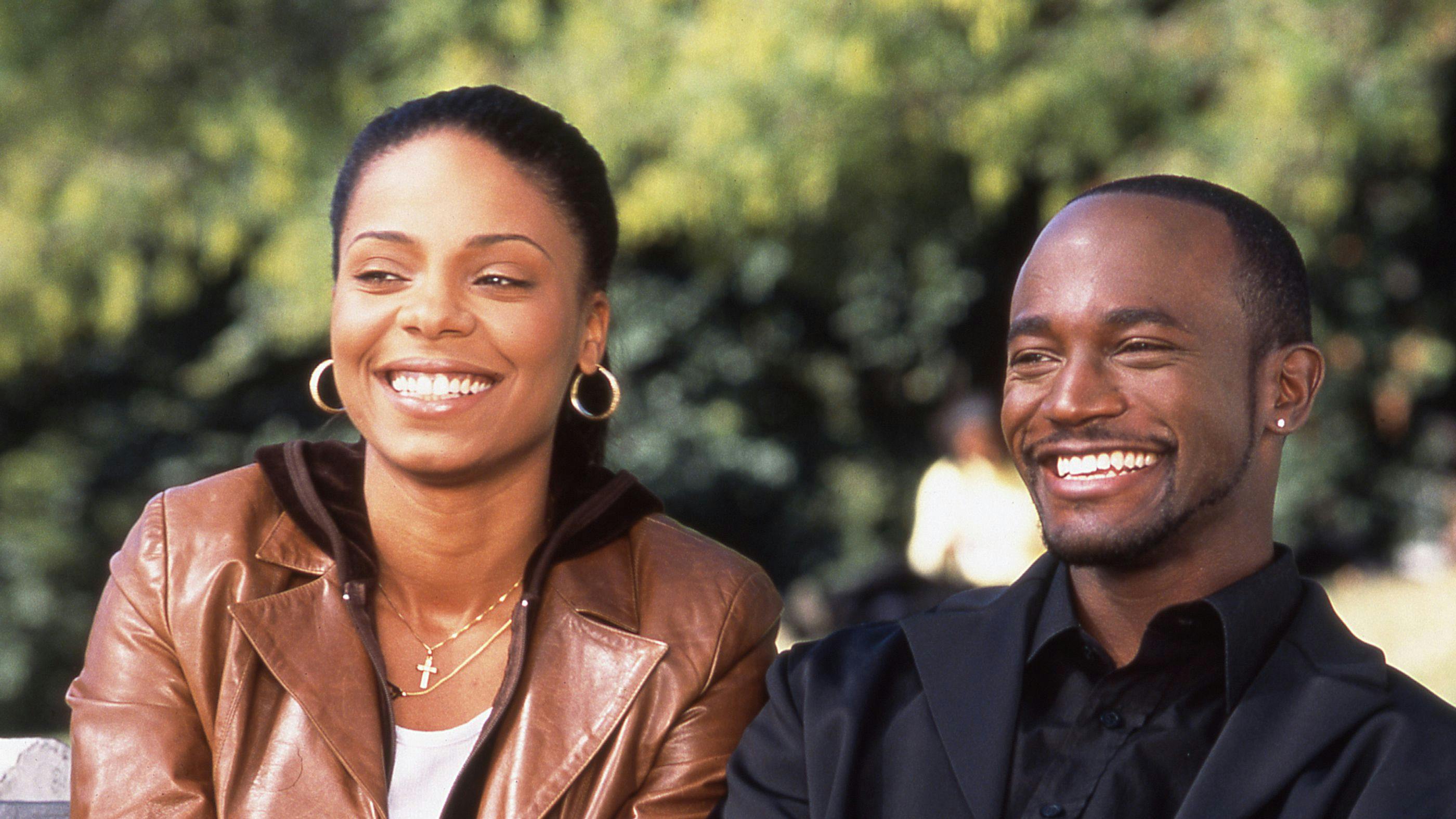
This movie, now titled Brown Sugar, would be both a love letter to Hip-Hop and an indictment of it, set as the backdrop for a story involving two young professionals (played by Lathan and Diggs) navigating the murky waters of the heart. Leads Dre (Diggs) and Sidney (Lathan) are childhood friends who bonded as kids over a love of Hip-Hop. Now, as adults, he's an A&R at a hot record label and she's an editor at Hip-Hop magazine XXL. They attempt to reconnect, but Dre is married, and he's frustrated with his job—which he quits after he's asked to A&R a project for an obnoxious novelty act called The Hip-Hop Dalmatians. Meanwhile, Sidney is interviewing rap superstars for a book she's writing about her love of Hip-Hop. Diggs knew that the film was unique and that drew him to the project.
"It was the fact that it was a romantic comedy with a twist and it’s so rare, that in reading scripts you find something that hadn’t been done before. " Taye Diggs explained in a 2002 interview. "In this take on Hip-Hop, especially since it’s very mainstream now, I thought it was time to do something like this now. That’s what excited me about it."
"Rick really did some amazing rewrites on the scripts," explained Lathan in an interview with BlackFilm. "When we were in rehearsals, we saw what worked, and he was open to making changes. There were certain points you had to make to get the point of the scene across but he was open to improv and making it so it’s natural for you."
Diggs had enjoyed a major breakthrough after How Stella Got Her Groove Back, the 1997 romantic comedy based on Terry McMillan's best-selling novel. After The Wood and 1999's The Best Man, he was one of the hottest young actors in Hollywood. And Sanaa Lathan, who'd delivered a star-making turn in the 1998 action flick Blade, had also seen her profile rise exponentially. Lathan, the daughter of Hollywood producer Stan Lathan, had co-starred with Diggs in both The Wood and The Best Man; and she'd also enjoyed success in her own McMillan adaptation, having played Zora opposite Wesley Snipes (as Franklin) in 1999's Disappearing Acts, an HBO production.
"You can’t help but be you in the films you do," Lathan said in 2002. "The greatest character actor is going to bring an aspect of themselves. I definitely think that was Sydney. I didn’t put much pressure on myself to really to make the character work because I met a woman who’ s a writer and I sort of modeled on her. She was a hip-hop journalist for a while and I realized that she’s sort of like my girls and me. I just thought about bringing myself to it and really try to tap into the passion for the music. The shooting was so fun. The laughs were real."
As a film, Brown Sugar doesn't stray too far from traditional romantic comedy territory. The audience is confident that Dre and Sidney will wind up together, but it's spirit and soul is the pair's affection for Hip-Hop as a parallel to their bond with each other. The movie's great scene-stealers arrive in the form of rapper/actors Yasiin Bey (then known as Mos Def) and Queen Latifah. Appropriate that two of Hip-Hop's most celebrated artists would provide some of this movie's most memorable moments. Mos is Cavi, an aspiring rapper who Dre wants to sign but who is turned off by the cookie cutter music Dre's label has been known for. And Latifah is Sidney's cousin Francine, who is urging Sid to make things real with Dre; while, unbeknownst to her, Cavi is nursing a major crush on Francine.
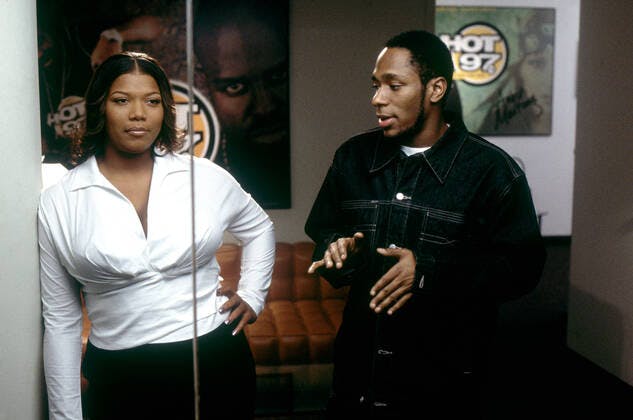
"He’s crazy and he’s unbelievably talented and unbelievably underrated," Diggs said of Mos Def in 2002. "He’s just what this movie needed. He’s what I needed, someone to play off because he’s raw. He won’t say anything that he doesn’t want to say, but he’s polite. We benefited from him and Queen Latifah. Latifah is hip-hop, she’s not old and neither is hip-hop, but she was there at the forefront. So it was good to have people that are so in the music be in this movie. It gave it some authenticity. I would work with anyone from this movie again but I would specifically love to do something with him and explore that relationship even deeper. There’s a lot going on there."
DROP YOUR EMAIL
TO STAY IN THE KNOW
By the time she appeared in Brown Sugar, Latifah's growth as a major Hollywood actress had become apparent. She'd closed the 1990s with appearance sin movies like Hoodlum, Bringing Out The Dead, Sphere and The Bone Collector, and the Jersey native was on something of a hot streak: she'd earn an Oscar nod for her performance as Matron "Mama" Morton in the hit musical Chicago; and in 2003, she would co-star with Steve Martin in the blockbuster comedy Bringing Down The House, and make an appearance in the hit Scary Movie 3. Her acting resume was becoming formidable, but Hip-Hop still had her heart. Music was and remains a priority for Latifah.
"Even if it's not what takes up the most time now, it's still what absorbs my brain the most," she told The A.V. Club n 2002 just after Brown Sugar hit theaters. "It's what I love. I've got the equipment in the house, and even if I don't have a record out, I'm still in my house making music. It's what I do, it's what I love, and everything else that has come to me has come to me through the music. I owe a lot to music."
"When did you fall in love with Hip-Hop?" has become something of a cliche in the twenty years since BROWN SUGAR was released.
But there's something about the way this film attempts to capture that innocent love of music, art and culture that drove so much of Hip-Hop's first twenty years. Not just the artists themselves, but the commentators and the gatekeepers who took that music from the streets to the world. Dre and Sid represent those journalists like Barry Michael Cooper, Scott Poulson-Bryant, dream hampton, Kevin Powell and so many others; as well as record people like Andre Harrell and Sylvia Rhone. Those people who documented Hip-Hop's rise, and those people who turned Hip-Hop into an industry; they are the inspiration and the lifeblood of this movie's story. They told Hip-Hop's story and they saw Hip-Hop's potential when the mainstream world was still scoffing at it. A movie like Brown Sugar is a culmination of what the first generation that grew up with Hip-Hop was able to do with it. The movie is about two kinds of love, and even with it's flaws, it remains a beloved film because of its heart. It was the story of a generation.
And twenty years later, that's still pretty sweet.
